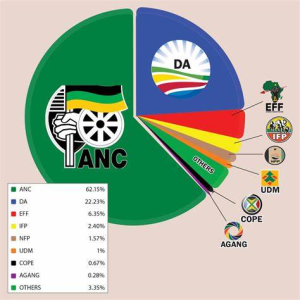South Africa, a powerhouse on the African continent, recently held its elections on May 29, 2024. This marked the country’s seventh democratic general election since the end of apartheid in 1994. The African National Congress (ANC), which has been the dominant political force since the country’s first democratic elections in 1994, faced its toughest election yet.
The ANC, which led the struggle against the white-minority government and the racist legal system known as apartheid, has seen its share of the vote at general elections fall steadily since its high-water mark of 70% in 2004. Surveys suggest that it may drop below 50% for the first time, forcing the party into some form of coalition.
The election saw South Africans head to the polls in national and provincial elections to elect a new National Assembly and state legislatures. The National Assembly will choose the president for the next five years. A total of 23,292 polling stations were open from 7am to 9pm (05:00 GMT to 19:00 GMT), with election day declared a public holiday to facilitate voting.
According to the Electoral Commission of South Africa (IEC), 27.79 million South Africans aged 18 and above registered for the elections this year, up from 26.74 million in 2019. Registered voters living abroad cast their votes on May 17 and 18, and voters with special needs, including pregnant women and people with disabilities, cast their ballots two days before election day on May 27 and 28.

South Africa follows a proportional voting system where parties and candidates compete for 400 seats in the parliament known as the National Assembly. For the first time, independent candidates competed in the elections. To accommodate this change, voters received three ballots instead of two, each requiring a choice of one party or candidate.
The economy has been a significant factor in the elections. Despite South Africans, on average, becoming richer over the last 30 years, there has been a downward trend in average incomes since 2011. This has led to accusations that the governing party has mismanaged the economy. Unemployment, particularly among young people, has been a major issue, with the World Bank stating that South Africa has the highest unemployment rate in the world.
In conclusion, the 2024 South African elections marked a significant moment in the country’s democratic history. With the ANC’s dominance potentially waning and the rise of independent candidates, the political landscape of South Africa is set for some interesting times ahead. As the dust settles on this election, the world will be watching to see how these developments shape the future of this influential African nation.

